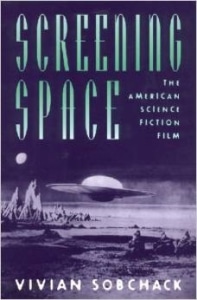Screening Space by Vivian Sobchack (book review).
Vivian Sobchack’s book ‘Screen Space’ is now in its fifth reprint. Originally published in 1980 under the title ‘The Limits Of Infinity: The American Science Fiction Film’ and this edition got a new chapter and an updated bibliography, even if it only adds another decade. Although I can’t remember that edition, it will be obvious from the start that much of Sobchack’s knowledge originally stopped at ‘Close Encounters Of The Third Kind’ (1977). We’ve come a long way since then, so why should this book still be relevant?
In many respects it’s because Sobchack concerns herself as to what exactly is Science Fiction and why there is such a discrepancy between prose and film. Where definitions are concerned, she references a lot of other people. Shame she never heard my definition that Science Fiction contains a change in our reality and staying consistent to the changes it causes. If anything, this is exemplified where she explains ‘2001: A Space Odyssey’ showing commercialised space-flights. We haven’t quite got that far but it is beginning to happen now. It does make me wonder why the commercial sector hasn’t been involved earlier because the encouragement to finding new resources off-planet might have been more of a help than a hindrance against costs.
In an odd way, reading this book now, there is the realisation that the film-makers of today must have read this book and others like it, as they are listed within this book’s bibliography, as part of their own studies and research should give extra insight. As such, I was finding things out that I found had been sorted out today. Sobchack description of dialogue being switched from functionary to realistic in our genre in chapter three being one of them. Just because the film is SF doesn’t mean you have to confound the viewer with gobblegook and such to remind them that this is our genre. The reminder she makes of how many of the 1950s films that had newscasters presenting information of the viewer is actually very telling because in those days it was the means to convince people of truth they were talking because it came with authority. These days, we might view this with a little more suspicion but that is more telling of how much we’ve evolved over the years. Look at how we view politicians the same way as well now as people not having all the answers.
Sobchack’s thoughts on music is still illuminating today as Science Fiction doesn’t have any type of music that is immediately identifiable with it. Me thinking objectively, I did wonder about electronic music or heavy orchestral pieces but the latter can be used in other genres. If anything, I tend to think there’s been something of a backstep. How many theme musics can you really hum that others can identify outside of ‘Star Trek’ and ‘Star Wars’? No one is writing melodies any more, just mood music. We really need more theme musics, don’t we?
The fourth chapter is an update although it only goes up to the 1980s, touching on various films, although I have to confess I can’t recall seeing on TV any time since which is a sharp reminder of how fleeting some of them have been. I did a quick scan on-line and some of those she mentioned aren’t even on DVD to even make a decision as to whether I could watch them or not. An odd indictment on our own media which also means relying on older books such as this as to what was/is out there. In many respects, what Sobchack has to say on later films still has some bearing. Audiences are still bedazzled by flashing lights than function. Although I’m not sure if I agree that all aliens are seen as friendly, I’d love to know her reaction to the ‘Predator’ films or the growing cyberpunk films of the 1990s onwards, there is still much to learn here.
I should point out that each of these four chapters are massive. Hardly surprising from a university professor and if anything, I hope it’s a lesson for new writers that smaller chapters are easier to digest and she could have done it here. The bibliography is actually rather interesting and although dated, many of the books are still out there. In some respects, I wish they were also re-released like Sobchack’s book has because they do provide insight from an earlier time and would ensure more people would own them.
Although I expected a lot of what Sobchack had to say to be dated, it does actually throw a lot of insight as to what was happening a few decades ago and certainly some of the motivation of what drives modern day film-makers that might make it worthy of checking out.
GF Willmetts
September 2014
(pub: Rutgers University Press. 345 page indexed illustrated enlarged paperback. Price: £21.95 (UK), $26.95 (US). ISBN: 0-8135-2492-X)
check out websites: http://rutgerspress.rutgers.edu and www.eurospanbookstore.com



